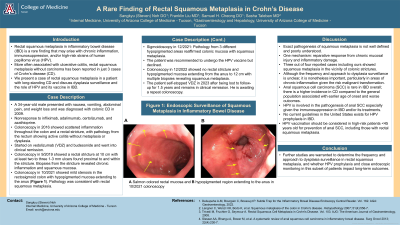Sunday Poster Session
Category: IBD
P1002 - A Rare Finding of Rectal Squamous Metaplasia in Crohn’s Disease
Sunday, October 27, 2024
3:30 PM - 7:00 PM ET
Location: Exhibit Hall E

Has Audio

Sangkyu Noh, DO
Banner - University of Arizona
Tucson, AZ
Presenting Author(s)
Award: Presidential Poster Award
Sangkyu Noh, DO1, Franklin Liu, MD1, Samuel H. Cheong, DO1, Sasha Taleban, MD2
1Banner - University of Arizona, Tucson, AZ; 2University of Arizona, Tucson, AZ
Introduction: Squamous metaplasia of the colon in inflammatory bowel disease (IBD) is a rare finding that may arise with chronic inflammation, immunosuppression, and/or high-risk strain HPV. More often associated with ulcerative colitis, rectal squamous metaplasia has been reported in 3 cases of Crohn’s disease (CD). Herein, we present a case of rectal squamous metaplasia in a patient with CD and discuss the need for dysplasia surveillance and HPV prophylaxis.
Case Description/Methods: A 34-year-old male presented with nausea, vomiting, abdominal pain, and weight loss and was diagnosed with colonic CD in 2009. He had nonresponse to infliximab, adalimumab, certolizumab, and azathioprine. A colonoscopy in 2016 showed scattered inflammation throughout the colon and a rectal stricture, with pathology from the rectum showing active colitis without metaplasia or dysplasia. He was started on vedolizumab and budesonide and went into clinical remission. In 9/2019, a colonoscopy showed a rectal stricture at 10 cm with ulcers around the area with biopsies revealing chronic inflammation and squamous mucosa with no pathologic alteration. A 10/2021 colonoscopy showed mild stenosis in the rectosigmoid colon with hypopigmented mucosa extending to the anus. Pathology was consistent with rectal squamous metaplasia. Pathology from 3 different hypopigmented areas during a 12/2021 sigmoidoscopy reaffirmed colonic mucosa with squamous metaplasia. The patient was recommended to undergo the HPV vaccine but declined. Repeat colonoscopy showed no rectal stricture and hypopigmented mucosa extending from the anus to 12 cm with multiple biopsies revealing squamous metaplasia.
Discussion: Although anal SCC is rare in IBD overall, there is a higher incidence in CD and compared to the general population, it is associated with earlier age of onset and worse outcomes. Though the frequency and approach to dysplasia surveillance is unclear, it is nonetheless important, particularly in areas of chronic inflammation; three out of four reported cases including ours showed squamous metaplasia in the vicinity of colonic strictures. Furthermore, HPV is involved in the pathogenesis of anal SCC especially given the immunosuppression in IBD and/or its treatments. Although there are no guidelines for HPV prophylaxis in IBD for SCC, HPV vaccination should be recommended in patients < 45 years old for prevention of anal SCC in high-risk patients, including those with rectal squamous metaplasia.

Disclosures:
Sangkyu Noh, DO1, Franklin Liu, MD1, Samuel H. Cheong, DO1, Sasha Taleban, MD2. P1002 - A Rare Finding of Rectal Squamous Metaplasia in Crohn’s Disease, ACG 2024 Annual Scientific Meeting Abstracts. Philadelphia, PA: American College of Gastroenterology.
Sangkyu Noh, DO1, Franklin Liu, MD1, Samuel H. Cheong, DO1, Sasha Taleban, MD2
1Banner - University of Arizona, Tucson, AZ; 2University of Arizona, Tucson, AZ
Introduction: Squamous metaplasia of the colon in inflammatory bowel disease (IBD) is a rare finding that may arise with chronic inflammation, immunosuppression, and/or high-risk strain HPV. More often associated with ulcerative colitis, rectal squamous metaplasia has been reported in 3 cases of Crohn’s disease (CD). Herein, we present a case of rectal squamous metaplasia in a patient with CD and discuss the need for dysplasia surveillance and HPV prophylaxis.
Case Description/Methods: A 34-year-old male presented with nausea, vomiting, abdominal pain, and weight loss and was diagnosed with colonic CD in 2009. He had nonresponse to infliximab, adalimumab, certolizumab, and azathioprine. A colonoscopy in 2016 showed scattered inflammation throughout the colon and a rectal stricture, with pathology from the rectum showing active colitis without metaplasia or dysplasia. He was started on vedolizumab and budesonide and went into clinical remission. In 9/2019, a colonoscopy showed a rectal stricture at 10 cm with ulcers around the area with biopsies revealing chronic inflammation and squamous mucosa with no pathologic alteration. A 10/2021 colonoscopy showed mild stenosis in the rectosigmoid colon with hypopigmented mucosa extending to the anus. Pathology was consistent with rectal squamous metaplasia. Pathology from 3 different hypopigmented areas during a 12/2021 sigmoidoscopy reaffirmed colonic mucosa with squamous metaplasia. The patient was recommended to undergo the HPV vaccine but declined. Repeat colonoscopy showed no rectal stricture and hypopigmented mucosa extending from the anus to 12 cm with multiple biopsies revealing squamous metaplasia.
Discussion: Although anal SCC is rare in IBD overall, there is a higher incidence in CD and compared to the general population, it is associated with earlier age of onset and worse outcomes. Though the frequency and approach to dysplasia surveillance is unclear, it is nonetheless important, particularly in areas of chronic inflammation; three out of four reported cases including ours showed squamous metaplasia in the vicinity of colonic strictures. Furthermore, HPV is involved in the pathogenesis of anal SCC especially given the immunosuppression in IBD and/or its treatments. Although there are no guidelines for HPV prophylaxis in IBD for SCC, HPV vaccination should be recommended in patients < 45 years old for prevention of anal SCC in high-risk patients, including those with rectal squamous metaplasia.

Figure: A. Salmon colored rectal mucosa
B. Hypopigmented region extending to anus
B. Hypopigmented region extending to anus
Disclosures:
Sangkyu Noh indicated no relevant financial relationships.
Franklin Liu indicated no relevant financial relationships.
Samuel Cheong indicated no relevant financial relationships.
Sasha Taleban: AbbVie – Advisory Committee/Board Member. Bristol Myers Squibb – Grant/Research Support. Eli Lilly – Grant/Research Support. Janssen – Grant/Research Support. Pfizer – Grant/Research Support. Takeda – Grant/Research Support.
Sangkyu Noh, DO1, Franklin Liu, MD1, Samuel H. Cheong, DO1, Sasha Taleban, MD2. P1002 - A Rare Finding of Rectal Squamous Metaplasia in Crohn’s Disease, ACG 2024 Annual Scientific Meeting Abstracts. Philadelphia, PA: American College of Gastroenterology.

